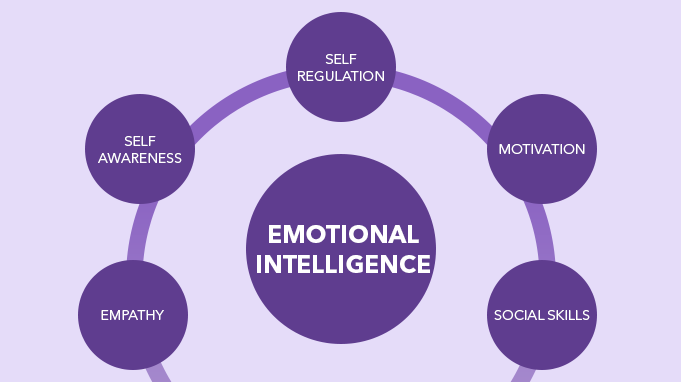Understanding and Utilizing Emotional Intelligence in the Workplace
What is Emotional Intelligence?
Emotional intelligence is the capability to identify, manage, evaluate and understand our own emotions and of the people around us.
The concept of emotional intelligence was introduced by psychologists Peter Salovey and John Mayer in 1990. The idea was generalized in 1995 by psychologist and author Daniel Goleman in his book, Emotional Intelligence: Why It Can Matter More than IQ.
High IQ can get you your dream job, but to sustain, grow and evolve, you have to have a stronghold on your Emotional Intelligence. The business rules are changing. We are being judged by this new yardstick and how smart we are or by our training and expertise and how well we handle ourselves and each other.
In 33 workplace skills, emotional intelligence takes first place in importance. It is not only crucial for the employees and business leaders alike. This yardstick is increasingly applied in choosing who will be hired and who will be not, who will be let go and who retained, who would be passed over, and who promoted.
This blog is for business leaders, managers, and employees to understand and utilize emotional intelligence in the workplace and help them in their professional development.
Let's Dive Deep
In today's professional world, emotional intelligence is one of the most essential skills, and you cannot shy away from it. It is not an inclination. It's a human trait that is necessary for any worker in an evolving workplace.
Here are the few statistics collected from several sources to prove why Emotional Intelligence is one of the significant factors for the productivity, growth, and success of an organization.
- 90% of top performers have above average emotional intelligence.
- Emotional Intelligence is responsible for 58% of job performance.
- 75% of the Fortune 500 use emotional intelligence training.
- Emotionally intelligent people earn $29,000 more on an average.
- Every point increase in emotional intelligence adds $1,300 to an annual salary.
Before moving forward, listen to this podcast. Here, emotional intelligence speaker, Grant Herbert delves into the various aspects of emotional intelligence, leadership and employee engagement.
The 5 Components of Emotional Intelligence
In your day-to-day life or workplace, you must have come across people who deal with problems positively, without losing their temper. They are respectful to their peers, self-motivated, and keep an endearing aura around them, making them approachable. They listen to others and make careful and informed decisions.
We like and respect these people, don't we?
Yes, we do. You know why? Because they have high emotional intelligence.
But the question is, where does this level of EI come from?
According to Daniel Goleman, there are five components to it. The more you improve on each of these areas, the higher your emotional intelligence becomes.
The Components

1. Self-awareness
Self-awareness is the ability to carefully identify your emotions, strengths, weaknesses, actions and understand how these influence others around you.
Self-awareness comes from the understanding of your being. You know your feelings and also how your actions and emotions can affect others. You are more aware of your surroundings since you actively observe them.
2. Self-regulation
Self-regulation allows you to manage your emotions and impulses wisely. Self-regulation is all about your actions. How you act in control and take calculated decisions without getting carried away.
3. Empathy
Empathy is all about understanding others' perspectives without being cynical—the ability to put yourself in someone else's shoes.
4. Motivation
To remain self-motivated and optimistic in any given situation. It is about enjoying what you do and working towards achieving your goals.
5. Social skills
Having good communication skills and being approachable. Practical social skills help build solid connections and healthy relationships.
Your Need for Emotional Intelligence in the Workplace
Giving and Receiving Feedback
In any workplace, the process of giving and receiving feedback is vital. It not only helps in employee productivity but also keeps them engaged and motivated. But the process is often hopeless. Managers or higher authorities almost always do not give much thought to it, making the process very ineffective.
When you are emotionally intelligent, you understand the importance of giving and receiving feedback. You know how to give and receive feedback constructively.
Dealing With Challenging Work Relationships
Do you have a cranky boss? Or do you find it challenging to build a strong working relationship with your teammates since your beliefs and opinions differ?
Conflicting ideas and opinions between you and your team members can stop you from achieving your goals and job satisfaction.
When you are emotionally aware, you understand their behaviors and actions and work towards having a more collaborative and satisfactory work relationship.
Accept The Change
You have heard the saying, 'Change is the only constant in life.'
Even in your working life cycle, you have to deal with change. This is when emotional intelligence helps you to adapt and grow with it.
Setbacks and Failure
The project you were working on for months gets shelved. You could not complete your targets or fell flat on the face while learning and executing something new. Setbacks and failures like these are inevitable.
When you have high emotional intelligence, you take every little bump in your road as a learning process. You grow and evolve with it.
Ways to Improve Emotional Intelligence in the Workplace
Active Listening
When you actively listen to your peers or any members of your workplace, you bring more clarity to the conversation. This helps you understand other's perspectives clearly and build respect and healthy work relationships. Emotionally intelligent people practice active listening and also observe other's body language while doing so.
Stop Reacting
Stop reacting and start responding more. Emotionally intelligent people know how to react to a bad situation, conflicts, or emotional outburst. They know how to stay calm and deal with the stressful situation without losing patience.
Stay Self-Motivated
You often meet unmotivated people who always find their way to misery and excuses. And then you come across people who are cheerful, happy, and ready to tackle any complex problems. The second kind is people with high emotional intelligence. They are prepared to face issues and give their best to solve them. They are always self-motivated and resilient.
Empathize
'The best skill I've developed and the one that's served me best as a founder, a CEO, and a marketer is empathy. Being able to put myself in the shoes of other people and imagine their pain, their problems, their workflows and speed bumps have been invaluable', says Rand Fishkin, founder of Moz.
When you empathize with people, you build a connection and relate to them on a human level. Empathizing with others helps you build respect and healthy relationships. People with high EI understand people from their frame of reference and possess this trait of keeping themselves in another's position.
Concluding
Developing emotional intelligence is not going to take place overnight. Understanding its components and then utilizing those every day in the workplace is the key. Stay focused and take baby steps, and soon the benefits of emotional intelligence will reflect on your career.

















